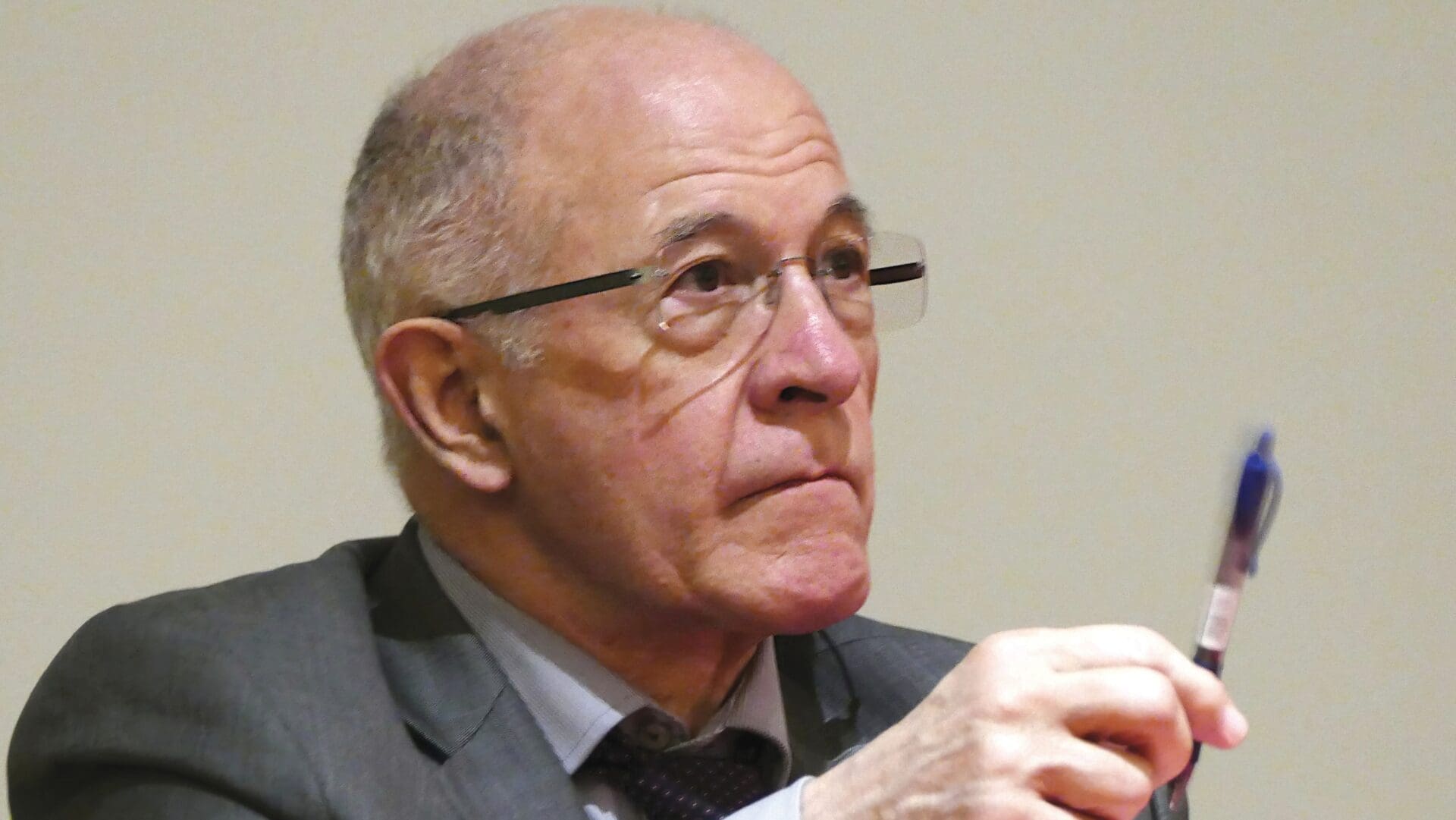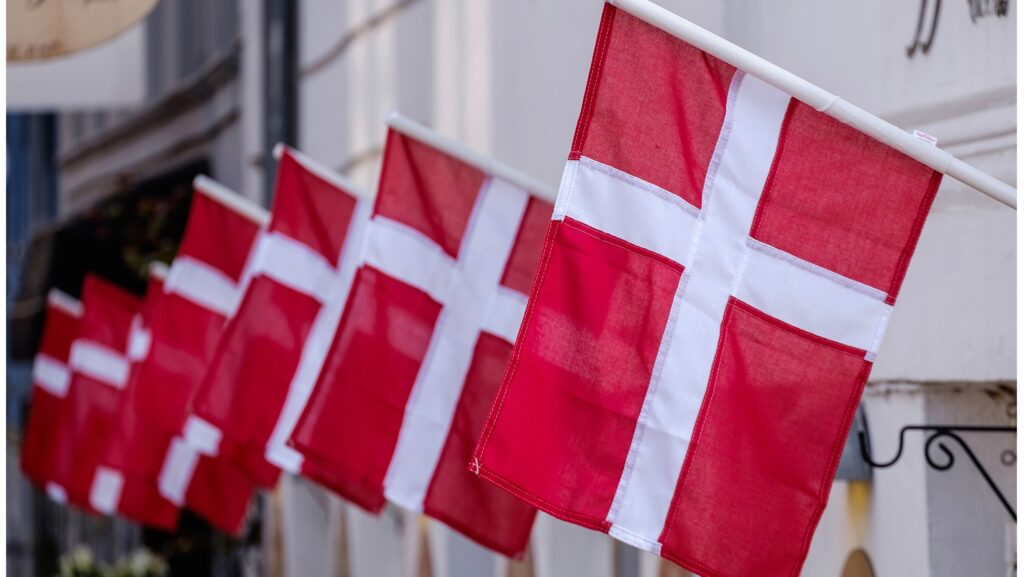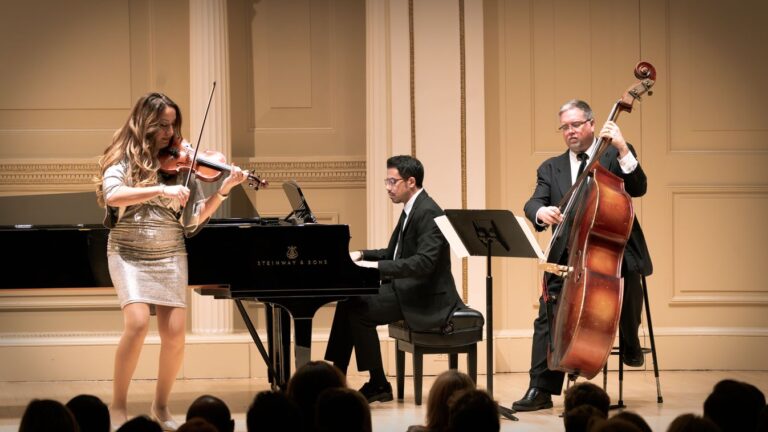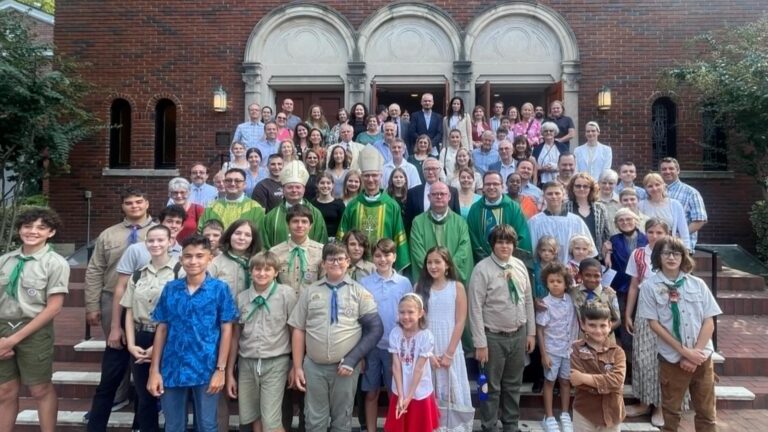This article was published in Vol. 3 No. 3 of our print edition.
Professor Rémi Brague Interviewed by Eszter Kovács
The French historian of philosophy who specializes in medieval Islamic, Jewish, and Christian thought is emeritus professor of Arabic and religious philosophy at Sorbonne University. His research covers several fields from metaphysics to the philosophy of religion and political philosophy. His work has given important insights into the question of European identity, its religious and secular origins.1 Our team, working on the research project entitled The Concept of Politics and ‘the Political’ in Modern Hungarian Political Thought from the 16th to the 20th Century, directed by Ferenc Horkay Hörcher, asked him about the interrelation of the religious and the secular in what we attempt to define as the political.
***
As you already know, Professor Brague, our team at the Research Institute for Politics and Government at Ludovika University of Public Service is currently working on a project on ‘Politics and the Political in Hungarian Political Thought’. First, we will study methodological and theoretical works on this subject and then apply them to the Hungarian and Neolatin corpus. We have also asked contemporary thinkers about their views on ‘the political’. It was with this in mind that we approached you. My first question may seem trivial, but I think that it is important for the broader readership. What is the point, in your mind, in distinguishing between politics (la politique) and the political (le politique)? Why do related fields, such as philosophy, history, or political theory, need to differentiate between these concepts?
Thank you for bestowing the honour upon me of inviting me to discuss this topic in the journal Hungarian Conservative. I am afraid political things are not my forte. As a historian of ideas, I have seldom studied political thinkers, and hardly ever in depth. I will, however, contribute what I can, to the best of my abilities.
The French language does not possess that feature which makes Greek and German so alluring for philosophers, i.e., a neutral form, with the accompanying possibility of turning each word, and in particular adjectives, into nouns by means of the definite article. When French people say la politique, in the feminine grammatical gender, they are employing some sort of shorthand for ‘political action’ or ‘politics’ as the implementation of a specific policy. When they say le politique in a neutral sense—which they rarely do, as it sounds somewhat pedantic—they mean ‘whatever is political in nature’, i.e., to do with the fact that human beings must live together in a city and thus are obliged to lead their lives in the smoothest and most harmonious way possible. A tall order, obviously…As for politics, it is the art of leading the political community, with the question being in which direction and to what end.
Furthermore, life in a political community encompasses all the aspects of human life, not only what we might strictly call political action. Politics is, as it were, broader than the implementation of this or that policy by a political power. Family life, economy, and culture play a part in the city—called in Greek the polis. Those aspects are even essential to human life: family life produces human beings, the economy enables them to survive by feeding, clothing, and housing them, while culture brings about the flourishing of what makes such a life fully human. Nevertheless, these things do not belong, at least directly, to political action as such. Some policies can support those basic activities or hamper them. We can hardly claim that political actions produce living human beings or commodities, let alone polite manners or beautiful works of art or literature.
We have been familiar with the principle of subsidiarity since it was formulated by Pope Pius XI, reacting against Italian ‘totalitarianism’, as defined and given a positive shade of meaning by the philosopher Giovanni Gentile.2 This principle is not only a moral rule telling us what should be done and avoided—namely the interference of a higher entity in the doings of a lower one, which could more efficiently act on its own and achieve the goal it pursues without external help. First and foremost, it takes into account a simple fact, namely, the actual relationships between those different layers of human life.
This is relevant when we consider the differences between the body politic in our culture—let us call it Europe, Latin Christendom, the West, or whatever—and the situation in Islamic culture, or rather, what should happen according to the legal scholars of that religion. When a pre-modern European thinker on political things used the word ‘politics’, he (for there were few female thinkers in pre-modern European culture) meant first and foremost ‘the common good’. The phrase is as old as the valaemon touticom, found on an Oscan tablet of the first century BC. When a modern author says ‘politics’, he or she (thanks to Hannah Arendt and other ladies!) means ‘power’. The leading questions are ‘who should wield power’ and ‘whose power is legitimate’.
In classical Islamic culture, on the other hand, the key word is ‘law’. Whose law should be enforced? The answer is God’s law, revealed to the Prophet Muhammad by the angel Gabriel, who dictated the Quran to him, and, to some extent, by the Prophet himself, whom the Quran hails as ‘the beautiful example’ (XXXIII, 21), whose life has an exemplary value. The Islamic regime is a theocracy, by which I do not mean the rule of men of religion—not even in present-day Iran—but what Flavius Josephus, who coined the word, meant by the term, that is, none of the three kinds of regime, neither monarchy nor aristocracy nor democracy, but the exclusive power of God’s law.3
Consequently, the Islamic equivalent of what we call ‘politics’ is broader in scope than our concept. It encompasses whatever needs to be regulated by norms in human life, which is almost everything: the government of the individual (ethics), the government of the family and of households—husband/ wife, father/children, leader/followers (that is, what was meant by economy in the antique world)—and, last and to some extent least, the government of the city (politics in the modern Western sense). We should avoid repeating a phrase that has become common parlance: ‘Islam does not distinguish between politics and religion.’ On the one hand, the authoritative sources for Islamic civilization tell us very little about what kind of regime is best, so that an Islamic democracy is in principle possible; on the other hand, however, Islam claims that what Allah wants is global in nature, thus no regulation of human action can be human in origin.
The concept we are discussing is relatively recent in making such a clear distinction. If we connect it to the well-known work by Carl Schmitt entitled The Concept of the Political, it can be dated at about a hundred years old, which is very recent for a philosophical concept. But the idea of it existed before it was lexicalized, highlighted, or separated as such. How do you see this in your own areas of interest? At what point can one identify the development of the same idea in ancient Greek, medieval Christian, or medieval Arabic thought?
In my opinion, the concept is as old as Aristotle. Nevertheless, political realities were not clearly distinguished from economic, social, religious, or other fields. The city as such existed in ancient Greece or, for instance, in Carthage, and later, in the Roman Empire. Those cities were global, multifaceted entities, in which it would have been difficult to distinguish between the dimensions I have just mentioned.
‘I have the feeling that something like new religious movements is arising, but hardly in a civilized way’
As for Carl Schmitt, while he may not have been a very decent person as far as his political choices are concerned, his thought is more interesting than most of his critics would have it. To his credit, he endeavoured to find the basic opposition between concepts which constitute the framework of every political action, that is, the opposition between friend and foe.4
What we label ‘medieval Arabic thought’ in fact encompasses thought written in Arabic by authors who hailed from every part of the Muslim world, not only from what we call at present Arabia. The political aspects of such thought were often developed by Persians. Their country had invented, centuries previously, a new political form which proved to be especially long-lived: the empire. The Macedonian Greeks and the Romans travelled very much in its wake. An empire is a thin cobweb of legal regulations, stretching over a motley of nations, each keeping its language, mores, and religion, which are left alone, provided they pay taxes, maintain a network of roads for the messengers of the central power, and furnish soldiers when this power wages war on its external enemies.
While the first Muslim dynasty, the Umayyads, was Arabic in origin, the second, the Abbasids, which ousted the first and seized the power in 750, chose to move the capital from Damascus to Baghdad. This brought about and at the same time symbolized a new orientation of Islamic political thought and political practice: the caliphs no longer looked towards the Eastern Roman Empire of Constantinople, but rather towards Persia.
They were able to take advantage of its long experience in government, expressed in the literary genre of the ‘mirror of princes’. These works contained practical wisdom for rulers, dating back before the conquest of Iran by Arab armies in the seventh century.
Historically, Islamic law, the so-called sharia law, or to be precise, any of its four possible forms, was never enforced in its entirety. This enforcement remained the dream of legal scholars. They wrote treatises which even dealt with cases that could scarcely be foreseen: how to share the inheritance when a great-grandfather inherits his great-grandson, how to punish a thief whose hands and feet had already been cut off but who continued stealing property, etc. Real leaders, generals, viziers, etc. paid lip-service to the legal scholars, bestowing all kinds of tokens of honour on them, but scarcely paid attention to their rulings in practice. Legal scholars closed their eyes when the local strong man strayed from their idea of Islam. From time to time they even issued fatwas (legal opinions) to condone a specific policy. For instance, in Hispanic history, the Almoravid dynasty, which had originated in Morocco before crossing the Strait of Gibraltar in 1086, asked for fatwas allowing them to depose the petty local sovereigns who had divided Islamic Spain after the fall of the Umayyads of Spain, the so-called reyes de taifas, in order to re-unite the part of the Iberic Peninsula which was under Muslim rule.
As for the rulers, they chose quite pragmatic and rather secular maxims of governance as their guidelines. These were pragmatic, but not necessarily ruthlessly Machiavellian. On the contrary, the leading image was instead the king as a mild shepherd caring for the well-being of the flock that was entrusted to him.
In our project, we have met with a certain methodological difficulty from the very beginning. The concept of the political has a twofold interpretation. On the one hand, we can understand it as the art of ruling or the art of acquiring, exercising, and keeping power, with well-known advocates from Machiavelli to Carl Schmitt. On the other hand, we can see the political as political friendship, solidarity, or efforts for the public good taken as a whole. This second approach has equally well-known authorities, such as Aristotle or Saint Thomas Aquinas. The divide between the political as something unpleasant but necessary that leaders need to exercise to maintain public order, or simply for survival, and the political as something rather positive and which is the responsibility of every citizen, seems to run through our history. How can you describe this opposition in the eras and civilizations you have been an expert in for decades?
The divide is very much the one which exists between the ancient, classical way of thinking about things political, and the modern view. As for political action, I am afraid that since the beginning it has been guided by maxims that are not morally respectable. Thucydides reported that the Athenian ambassadors told the Melians that ‘those who have the upper hand do whatever they can, and the weak yield’ (dunata de oi proukhontes prassousi kai oi astheneis xunkhôrousin).5 There is a difference, however, between the Greek historian and Machiavelli. Thucydides only relates what some people did but refrains from any moral judgement. The Florentine statesman and thinker praises such behaviour and advises rulers to act along the same lines. The absence of a value judgement is not a theoretical method; on the contrary, it becomes the implicit assumption that political action is above any kind of value judgement. The maxim Salus patriae suprema lex esto6 was to be applied to political decision-making only in cases of emergency. It was never acknowledged as the basic and permanent rule of each power.
It is interesting to compare the basic image in Thomas Hobbes’s political thought with the way it was treated by medieval authors. Hobbes borrowed from the Bible, which he explicitly quotes in the frontispiece of his main work, the description of monsters—some sort of crocodile and hippopotamus—present in the last chapters of the Book of Job. He chose the Leviathan. The body of the other monster, in particular the scales on the back of the Behemoth, were for John of Salisbury the symbol of the way in which wrongdoers help one another in their lies and build a society of evil.7
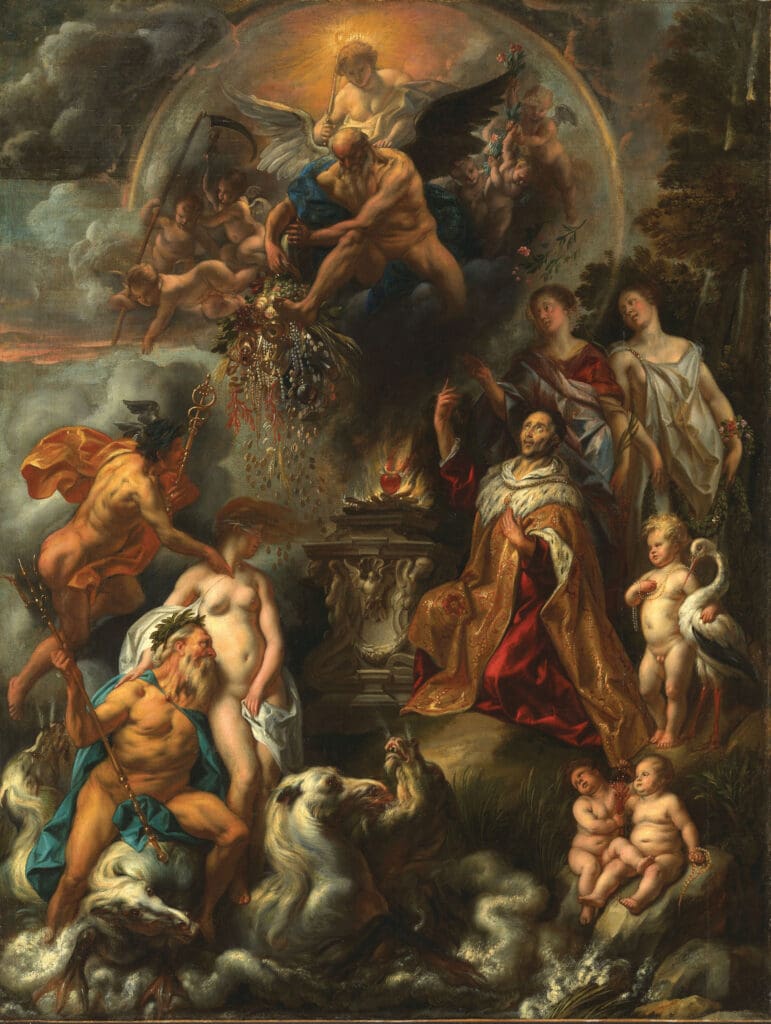
‘The decrease in influence of the churches unleashes a tidal wave of effects’
In each culture, there were cruel tyrants and benevolent kings, voracious oligarchs and virtuous aristocrats, fickle mobs, and responsible citizens of democracies. What is novel in modern political thought, however, is that it deliberately leaves aside the question of the Good. It is lowered to the level of opinions and left to the free decision of individuals. This applies even in religious matters, where the ultimate fate of the soul, eternal salvation or perdition are at stake. Indeed, religion was the very first dimension of human existence which was reduced to the level of ‘opinions’. At least, this situation was the case until recently.
At present, we may be entering a new era, or are already living in it. Perhaps the hackneyed adjective ‘post-modern’ could gain some legitimacy in this respect. In our Western ‘liberal democracies’, we are experiencing a strong return of the idea of good, but under another guise. Not the common good which pre-modern states were meant to aim for, but instead ‘values’ such as ‘human rights’, ‘human dignity’, and the like. The state sets itself the task of bestowing ever newer rights, even inventing them, and guarding against anything that could endanger them. These rights increasingly resemble a religion, and quite a fanatical kind of religion at that. Whoever objects to them is automatically treated as insane or dangerous, or at least ceases to be admitted as worth debating with.
We know from painful experience that driving a wedge between the moral good, what Orwell called ‘common decency’, and the Good supposedly brought about by political action is not without consequences. If one works towards the capitalized Good, one is allowed to act against the lower-case good. Dostoevsky’s Ivan Karamazov repeatedly claimed that, since there is no God, ‘everything is permitted’ (Всё позволено). What was confined to the pages of a novel or was only a half-playful hypothesis in 1880 became a serious historical reality two generations later. I quoted elsewhere what I believe to be its earlier occurrence as a seriously meant programme of action in an editorial by the Latvian Bolshevik leader Martin I. Latsis (1888–1938) in the journal of the Ukrainian Cheka: ‘everything is allowed to us’ (Нам все разрешено).8 I recently realized that the formula had been coined much earlier, in 1794, in the writings of the French revolutionary Joseph Fouché (1759–1820): ‘everything is permitted for those who act in the direction of the revolution’ (tout est permis pour ceux qui agissent dans le sens de la révolution).9
In France nowadays, most intellectuals would agree that the political belongs to the secular order as opposed to the ecclesiastical sphere. A large part of the population would agree, probably under the influence of the secularism that is promoted by the educational system and the media. Some people would say that religions are for the spiritual and not for the political. In the ages you have been studying throughout your career, however, the political was religious, and not simply because it was before 1905. The notion of political religions, or simply the everyday notion of beliefs (religious or not) shows that while it was possible to separate the state and the church, it was not necessarily possible to separate political happenings from religious aspects in a wider sense. How would you convey to younger generations, born a century after the legal separation of the state and church in France, that religion was part of politics, and thus regarded as a political matter in the past?
This raises a plethora of questions. The political and the religious were in the pre-Christian, so-called ‘pagan’ world, very much the same thing. The gods were the local gods of the city, and Socrates was tried on the charge of bringing in foreign gods. The early Christians were all the more easily able to distinguish themselves from state power to the extent that the latter, the Roman Empire, prosecuted them for it. Once the empire had legalized Christianity under Constantine and even made it the official religion of the state under Theodosius, the church reacted by building institutions which enabled it not to be utterly swallowed by the state and converted into an ideological instrument of legitimation. These institutions included a legal system of its own, canon law, and the monastic life as a way for people to live after the persecution ceased in the same precarious way as they had when they were in full swing.
In the Middle Ages, we witness a paradox which became acute in the eleventh and twelfth centuries, during the Investiture Controversy: secularity was fostered by the church, and sacrality by the empire. Instituting the name of ‘Holy Roman Empire’ was not an insignificant move, and aimed to challenge the monopoly of the sacred, hitherto held by the church with its sacraments. The message of the papacy to the earthly rulers was: ‘Mind your own business, and we will ply our trade. Content yourselves with ensuring a just peace among your subjects; the sacred is our job.’
Modern times produced a kind of new variant of this division of labour, under various guises: the American ‘wall of separation’, the untranslatable French laïcité, an official, but powerless established religion in the United Kingdom, the Netherlands, and Scandinavia, concordats in Germany, etc. These enabled a compromise which makes the coexistence of various trends possible, but which is fragile.
Nowadays, I have the feeling that something like new religious movements is arising, but hardly in a civilized way. The different churches used to act as guarantors of a peaceful order by casting the religious instinct into rational forms of expression, including concepts borrowed from philosophy. This goes under the name of theology. The decrease in influence of the churches unleashes a tidal wave of effects. Just think of the fanaticism which some young people exhibit in their desire to ‘save the planet’, as they put it. If the price of this salvation implies that the human species is to be done away with, well, never mind, good riddance. The mumbo-jumbo goddess Gaia demands human sacrifices, and for some ‘deep ecologists’ this may even involve the disappearance of every human being for the good of the other species.
The problem of educating the younger generations is a crucial one, not only regarding the question of how to articulate religion and politics. Historical ignorance is rampant in present-day Western countries. This allows a desperately one-sided view of the past to hold sway in our minds. What we need to try to teach the younger generations is not only that religion used to be part and parcel of political life but that in order for political life to be conducted in a fair way we need a decent and civilized kind of religion.
We have just discussed how the political can be defined as something close to solidarity on the one hand. On the other hand, it has also been defined as the coherence of the political community when facing threats, as in the Schmittian distinction between friend and foe. However, all religions do not necessarily act in the same way. A so-called ‘non-believer’ was regarded as an enemy in the age of the confessional division, during religious wars, or in areas with a mixed population of Christians and Muslims, etc. Secularism was meant to put an end to this, since it tolerates different religions, as well as agnosticism, atheism, scientific materialism, etc. But can the political becoming increasingly secular be more equitable or more peaceful? It may be wondered, somewhat doubtfully, whether Western evolution towards the secular has actually resolved the problems which characterized the times when the political was religious? Or are we not witnessing, nowadays, a violent conflict between the secular and the religious?
Let me begin with the overall historical framework. All this involves a definite view of the so-called ‘wars of religion’ of the sixteenth and early seventeenth century, including the Thirty Years’ War, which was brought to a close by the treaties of Westphalia (1648). This narrative, very much in keeping with the ‘Whig conception of history’, is highly biased and should be subjected to scrutiny. The distortion of reality begins with the very name ‘religious wars’, which suggests that those wars were triggered by religious causes, namely antagonism between Catholic and Protestant princes. In fact, those struggles make better sense when we consider the setting—that is, the birth of the modern state under its first incarnation as an absolute monarchy. Religious controversy was heavily instrumentalized, or simply left aside when necessary. For instance, France, under Richelieu, who was a cardinal of the Roman Church, sided with the German Protestant princes against the Catholic Habsburg Emperor. In Scandinavia, especially in Sweden, the Lutheran Reformation was foisted upon the people on the occasion of a civil war. Since the majority of the population wanted to retain the Catholic liturgy, they kept its paraphernalia at the beginning, but emptied them of their deeper meaning.
As for the whole narrative of secularization as some sort of steamroller which no earthly power can thwart, this idea has been called into doubt by many scholars of society, be they sociologists by training or philosophers. Let me mention the Austrian-born American Peter Berger (d. 2017) or the German Hans Joas, still alive and kicking, thank goodness. It is true that the influence of institutionalized religion is at a serious ebb. This is the case for the large churches. In the Protestant world, the big Lutheran and Calvinist Churches are losing many people to the Evangelicals. As for Catholicism, people simply leave the church without any Christian alternative. In other religions, which were never heavily institutionalized, like Judaism, the haemorrhage is less visible, but is real all the same. On the other hand, religious feeling, or the need for religion, hardly disappears, but takes other forms, more diffuse, less organized, with a weaker propensity to go through the sieve of reason and to build a culture.
Secularized regimes have not been more peaceful than the religious kind. The two worst regimes the twentieth century experienced were both atheistic, and even violently against the two biblical religions. Even so, they were diametrically opposed to each other. Nazism was anti-Jewish, and consequently anti-Christian. Hitler wiped out Jewish people from all the territories Germany conquered. He planned to do away with its heir, the Christian churches, after the final victory—as long as the war lasted, it would not have been apposite to divide the German people. Leninism went about things the opposite way: it opposed Christianity, and as a consequence, its roots in Judaism, hence in the Soviet Union, the Christian church was first brought to heel, by killings and deportations, and by building a puppet church. Then, after the show trials following the supposed (and mainly Jewish) ‘Doctors’ Plot’,10 a massive deportation of Jews to Birobidzhan, in Eastern Siberia, was planned, but did not take place because Stalin’s death put an end to the project.
The conflict between the secular and the religious which you mentioned is nowhere as serious as in contexts where the very distinction between the secular and the religious is rejected. This is the case in Islam.
Power, in a certain sense, has always been divided, since well before the modern doctrine of the separation of powers. From the doctrine of the two swords to the separation between the legislative, the executive, and the judicial, it has come a long way. It seems, however, that there are two recurrent goals: to legitimize power and to separate different powers to maintain equilibrium. According to this logic, is the political the art of the legitimization of power, before actually exercising it? Or does any entity have to exercise power before developing theories of its own legitimacy?
The doctrine of the two swords found its classical expression in Saint Bernard of Clairvaux: ‘Both swords belong to the Church, the material one and the spiritual one. But the former must be drawn out for the Church, whereas the latter is drawn not only for the Church, but by the Church; the latter is in the hand of the priest, the former in the hand of the soldier, but at the bidding of the priest and of the general’ (Uterque […] Ecclesiae, et spiritualis scilicet gladius, et materialis, sed is quidem pro Ecclesia, ille vero et ab Ecclesia exserendus: ille sacerdotis, is militis manu, sed sane ad nutum sacerdotis et nutum imperatoris).11 The two swords are not on the same level. One is material, the other merely spiritual, without possessing any ‘big battalions’. The dream of Pope Boniface VIII (1303) was that the temporal sword would be drawn against the enemies of the church, be they external, such as adherents of other religions—at his time, mainly Islam—or internal, such as heretics of all kinds, which almost never happened.
Many centuries later, the French mathematician and philosopher Auguste Comte (1798–1857), while certainly rather insane, highlighted a very important point. Since the beginning of his intellectual career, when he was still an amanuensis of the utopian economist philosopher Claude-Henri de Saint-Simon, he argued that the main intellectual problem of modern times was the absence of an authentically spiritual power. This power could serve as a counterbalance to limit the material power of engineers, managers, and bankers, who, in the industrial age, were taking the lead. In the Middle Ages, the emperor wielded earthly power, while the pope had an influence over his fold. His weapons were spiritual in nature: he could, for instance, suspend the sacraments or refuse to allow the divorce of a king and, as a last step, excommunicate anyone who refused to comply. The emperor could compel opponents to obey; the pope could only convince people who acknowledged his authority and ran the risk of a schism—which happened, for instance, when the English king Henry VIII declared himself the head of the Anglican Church. To this day, the question raised by Comte has not yet received a satisfactory answer.
You spoke in a podcast made by the Académie Catholique de France about your book ‘The Legitimacy of the Human’ (La Légitimité de l’humain). How do you see the connection between what you defined as ‘the human’ and ‘the political’? Are they complementary, separate, or even antithetical? The question is not a minor one since the conceptions of the political which present it as the art of sovereignty aim to rule over humans, while the conceptions of the political as something akin to solidarity aim to integrate the good of humans in their projects as much as possible.
As a matter of fact, the podcast that you alluded to only offered a rather sketchy summary of a whole book of mine, to which I planned to give this title. My editor preferred another title, namely ‘The essence (propre) of man’. Her reasons were sound: this sounds less academic and off-putting, so I finally yielded, albeit with some reluctance. This title was also used in the Spanish, Czech, and Romanian translations. The problem is that it does not fit with the content of the book. Fortunately, the original title ‘The Legitimacy of the Human’ was kept by the English translator.
Be that as it may, the existence of the human obviously logically precedes the problem of the political. In order to have a city, you must first have human beings. As a consequence, the question whether this or that regime or this or that particular ruler can claim some legitimacy, although important in the political realm, comes after the preliminary question about the very legitimacy of the human.
We cannot behave as if the existence of human beings were something we can take for granted. To be sure, mankind is endowed with special features like reason and freedom, which distinguish it from brute animals. At the same time, it is a living species, too. As such, it is subject to the same needs as the other, that is to say, animal species. The individuals who make up humanity have a limited lifespan. The species can survive if and only if the individuals which happen to be alive bring into existence offspring which will survive them and replace the dead. In the animal kingdom, this was ensured by sexual desire and the instinct to care for the new-born. As for humankind, in former times, its survival was ensured, at least for the most part, by the same means. In our time and age, however, this existence depends less and less on instinct, and more and more on our deliberate choice to beget children.
Today, if the existence of a nation, regardless of its political regime, depends on the existence of the human beings that it comprises, the political authorities can influence the will of the citizens to raise children, fostering or hampering it, depending on their policy. They do that by means of their legislating activity. Or, on the contrary, they do not, in which case they have to blind themselves to the ineluctable decline of their own people.
This interview was carried out within the Project no. OTKA K143251, which has been implemented with the support provided by the Ministry of Culture and Innovation of Hungary from the National Research, Development and Innovation Fund, financed under the K 22 funding scheme.
NOTES
1 Professor Rémi Brague’s major works have been translated into numerous languages, including Hungarian. We can read in Hungarian his Európa – a római modell (Europe, la voie romaine, 1992, published in Hungarian in 1994).
2 Pius XI, pope between 1922 and 1939. Giovanni Gentile (1875–1944) was a thinker described as the ‘philosopher of Fascism’. (Note by E. K.)
3 Flavius Josephus, Against Apion, II, §165, ed. L. Blum (Paris: Belles Lettres, 1930), 86. (Note by R. B.)
4 Carl Schmitt, Der Begriff des Politischen [1932], §2 (Berlin: Duncker und Humblot, 2002), 28ff.
5 Thucydides, War of the Peloponnese, V, 89. (Note by R. B.)
6 ‘The supreme law must be the safety of the country.’ (Note by E. K.)
7 John of Salisbury, Policraticus, VI, 1. (Note by R. B.)
8 Martin I. Latsis in КРАСНЫЙ МЕЧ (The red gladius), no. 1, 18 August 1919, https://abc1918.livejournal. com/70644.html. See my recent book Sur l’islam (Paris: Gallimard, 2023), 134. (Note by R. B.)
9 Instruction adressée aux autorités constituées des départements de Rhône et de Loire, 26 brumaire de l’An II (16 November 1793). (Note by R. B.)
10 Accusation against a group of physicians in Moscow according to which they intended to kill Soviet leaders. The process went on from 1951 to 1953. (Note by E. K.)
11 Bernard of Clairvaux, Letter 256 to Pope Eugene III, in Opera (Rome: Editiones Cistercienses, ed. J. Leclercq & H. Rochais, t. 8. 1977), 163; see also De consideratione, IV, iii, 7, in Opera, t. 3, 454.

